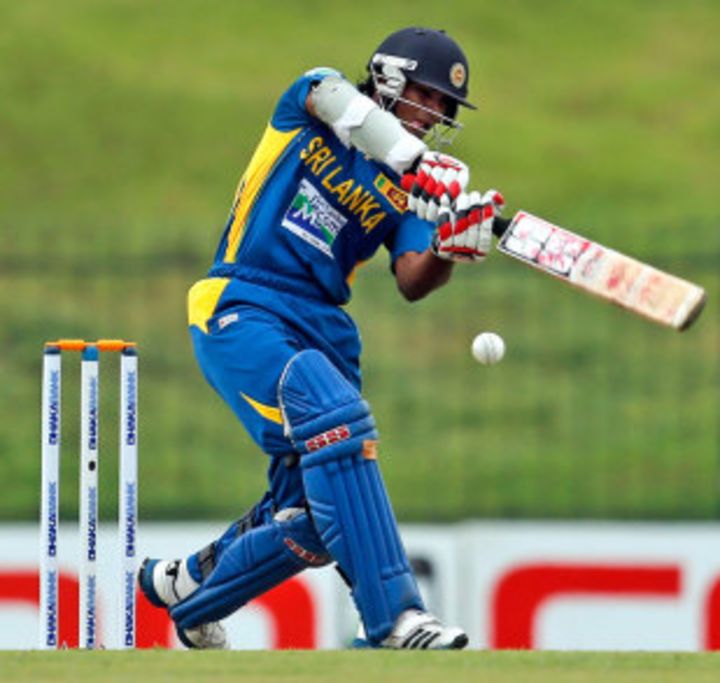Will fifth time be the charm?
On paper, Sri Lanka have the balance and the firepower to be a genuine title-contender, but if they cannot unearth the collective courage that has ruled their past campaigns, a semi-final exit shapes as a satisfactory result
Sri Lanka's recent ICC tournament history reads like the script for a formulaic romantic comedy, only without the feel-good ending. They may have only been bridesmaids four times, instead of 27, but they still haven't been able to take James Marsden home. The journey through each tournament has featured its share of warm-fuzzies (Muttiah Muralitharan picking up Scott Styris off his last ball in home internationals, newbie Angelo Mathews' pioneering athleticism on the boundary), as well as a mix of seemingly insurmountable obstacles that are unconventionally overcome (when faced with a supremely in-form Chris Gayle in the 2009 World Twenty20 semi-final, Sri Lanka dismissed all his teammates and left Gayle unbeaten, carrying his bat). Having done everything right though, Sri Lanka have ended up at the wrong terminal with their hearts broken, instead of catching their soulmates at the airport.
The Champions Trophy is a little down market - more Paul Rudd than Brad Pitt or Ben Affleck - but many of the protagonists of those four finals will make up the preferred XI in England, and by now are desperate for a taste of major-tournament glory. Men like Mahela Jayawardene, Kumar Sangakkara and Tillakaratne Dilshan only have a few chances left.
This time though, expectations of the team are different. There may not have been a major turnover of personnel since the World Twenty20 last year, but there has been a firm focus on regeneration, and mistakes have been cast as learning experiences. A home loss to Bangladesh would ordinarily draw the ire of Sri Lanka's fans, but with two young men at the helm, a drawn ODI series was largely tolerated. On paper, Sri Lanka have the balance and the firepower to be a genuine title-contender, but if they cannot unearth the collective courage that has ruled their past campaigns, a semi-final exit shapes as a satisfactory result.

Vital to their hopes is the batsmen's ability to adapt to England's early-summer conditions, and in doing so, dull the threat of three of the best pace attacks in the tournament. England's confident fast men will back themselves at home, while both New Zealand and Australia's attacks have already caused Sri Lanka strife in helpful conditions in the past year. The team has also not had a lot of time to train together because of the IPL and the abandonment of their first warm-up match will not have helped either.
Key player
As in each of their recent runs to the final, Sri Lanka's bowling shapes as their stronger suit, and this time Nuwan Kulasekara, not Lasith Malinga, is best equipped to have most impact. Kulasekara has added an away-seamer to his stock indipper in the past year, and has also recently excelled in seam-friendly conditions abroad. He bowled the spell of his life at the Gabba in January, wiping Australia out for 74 with a five-wicket haul, and with the two new balls now making Malinga less effective at the death, he will hope to pick up the slack with similar performances.
Surprise package
A 22-year-old pocket-battleship, Kusal Perera has been one of the most exciting finds for Sri Lanka, in recent months. Bold to the point of being brash, and possessed of a technique learned from watching Sanath Jayasuriya on television, Perera has so far impressed in seven ODIs in Australia and Sri Lanka. He is yet to acquire the judgment that was key to Jayasuriya's success and having looked good while tonking bowlers to the boundary, he has tended to perish abruptly to a ball he should have treated with more respect. If he can form a fruitful partnership with Dilshan atop the innings, Sri Lanka have an opening pair capable of batting the opposition out of the match in the first 20 overs.
Weakness
Opponents have often spoken of Sri Lanka's 'soft underbelly' with the bat, and the middle order remains their least convincing area ahead of this tournament. Angelo Mathews is likely to enjoy seaming pitches with the ball, but although he is among the world's finest finishers on his night, he carries an unreliable streak that is difficult to ignore. Thisara Perera and Jeevan Mendis have provided valuable late-innings adrenaline shots in the past, but are less capable of spearheading sustained recoveries should things go awry at the top. Attacks that take four Sri Lanka wickets before the 20th over will be confident of dismissing them cheaply.
Tournament history
Despite their consistency in World Cups and World Twenty20 tournaments, Sri Lanka have not made it out of the group stage in the last three Champions Trophy tournaments. In 2009, they misread two pitches, playing two spin bowlers on a green top against England, and fielding first on a flat track against New Zealand, and were beaten in both matches. They were joint winners in the 2002 tournament, which was played in Sri Lanka, after rain made the final against India impossible.
Recent form
Sri Lanka lost their first ever home ODI to Bangladesh in March, finishing with a shared series, but claimed a more creditable drawn series in Australia early in the year. Had the Sydney Cricket Ground's drainage not mysteriously failed after less than an hour of drizzle, Sri Lanka were favourites to win that match and walk away with the trophy.
Key batsmen are largely out of form, having fared poorly in the IPL, but bad results leading into a big tournament have not stopped Sri Lanka from performing admirably in it in the past, and the side will view the Champions Trophy as a fresh challenge in a new format.
Andrew Fidel Fernando is ESPNcricinfo's Sri Lanka correspondent. He tweets here
Read in App
Elevate your reading experience on ESPNcricinfo App.